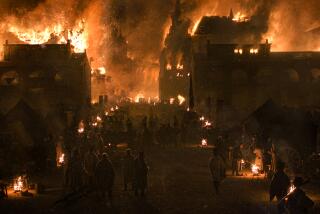Soviet and U.S. Film Firms Join in 1st Venture
- Share via
MOSCOW — The leading Soviet film studio, Mosfilm, on Wednesday signed its first agreement with an American partner to co-produce a feature film, “Rendezvous With Napoleon,” based on a Russian novel about the French emperor’s invasion of Russia.
Vladimir Dostal, Mosfilm’s general director, linked the contract to the recent Soviet-American summit meeting here and said that his studio and others had been seeking American partners and that the improvement in relations between the two countries had finally made such deals possible.
Tom Meehan, president of the Los Angeles-based FresFilm, said he was pleased that his company, 6 years old and with only a documentary on Holy Week now in distribution, had been selected over larger U.S. groups, including major studios.
“Mosfilm wanted a relationship, not a one-picture deal, and that is what we are offering,” Meehan said. “We are already looking at several more proposals with them and are going to become involved in other projects with Lenfilm in Leningrad. . . .
“Our intention is to become the principal U.S. partner in Soviet-American co-productions. We are very pleased to have beat out the competition, most of which was much bigger than we are. There is a real rush from Hollywood to get in the door, and we got through first.”
The deal between Mosfilm and FresFilm for “Rendezvous With Napoleon” leaves script writing, casting, direction and most of the production largely to Mosfilm, which will finance filming in the Soviet Union and probably in Poland as well. A majority of the cast would be from the Soviet Union.
Sergei Soloviev, one of the most prominent Soviet cinematographers, who will direct the film, said he plans to recruit the best Soviet talent so that the film will draw major actors from around the world.
“It will be the first such opportunity that they will have had to work together from East and West, and the story and its themes should attract them too,” he said.
The film will tell the story of Napoleon’s invasion of Russia, including the burning of Moscow in 1812, the fierce resistance put up by the Russians and the ultimate annihilation of his Grande Armee of 500,000 men as it retreated during the bitter Russian winter.
But as Soloviev envisions the film, it will also describe the impact of the ideas of “liberte, egalite, fraternite,” that the French brought to Czarist Russia for the first time, planting the political seeds that led more than a century later to the Bolshevik Revolution of 1917.
“In Russia, we owe something to Napoleon, to the French Revolution,” Soloviev said. “This is not a one- or two-dimensional story we are attempting.”
FresFilm will produce and finance the filming to be done in Paris and on St. Helena, the South Atlantic island to which Napoleon Bonaparte was eventually exiled. FresFilm will also pay the hard-currency salaries of American and other international actors to be hired, and finance the rental of modern cinematographic equipment to be brought to the Soviet Union for the filming.
Meehan said the final editing of the film, which will probably take two years to make, will be done jointly in the United States and that his firm and Mosfilm will share distribution rights in order to recover their investments.
Mosfilm initially had budgeted about $3.2 million--a relatively large sum here--for the film but, with U.S. participation “opening many new possibilities,” will probably increase its share of the expanded budget to about $12 million, Mosfilm executives said.
Meehan said that until the general budget is drawn up, he cannot say what the American investment will be, although he expects to begin raising money immediately in the United States.
Although there have been other Soviet-American co-productions, largely during the earlier period of Soviet-American “detente” in the mid-1970s, they were fraught with production problems and rarely were economic successes.
“We stayed away from most of those--they were just too badly flawed,” a Mosfilm executive said. “This film is artistically sound and economically viable as well as being pretty good politics.”
Meehan described the negotiations with Mosfilm as intense “hard bargaining,” but somehow easier and more straightforward than he expected.
“I came with a great deal of anticipation and a great deal of skepticism,” he said. “With what we had been led to believe about the Soviet Union and its people, I didn’t know whether it was possible to do a deal, let alone make a movie.
“There were certain things that I, many Americans, believe--that Russians don’t like Americans, that some Russians want a war with America. . . . I was expecting half a dozen KGB men (Soviet security police) at our negotiations and bugs under the tape. Hollywood stuff. None of that was true.”
More to Read
The biggest entertainment stories
Get our big stories about Hollywood, film, television, music, arts, culture and more right in your inbox as soon as they publish.
You may occasionally receive promotional content from the Los Angeles Times.










